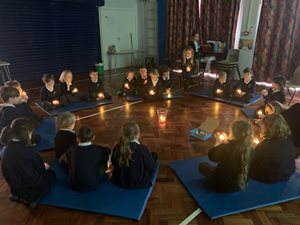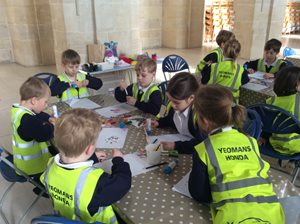Religious Education
Children come to school with a natural curiosity about their world and existence. Our intent is to develop an understanding of the meaning of faith and the social, moral, and personal significance by:
Nurturing all children from families of Christian faiths, no faith, and other faiths.
Contributing to pupils’ personal development including spiritual, moral social and cultural, and linking this with the teaching of PSHE education (Personal, Social, Health and Economic).
Giving pupils the opportunity to explore religious language and symbolism.
Introducing children to other world faiths.
Experiencing Christian faith and places of worship.
Encouraging children to ask questions to develop their enquiring minds and open hearts - letting their light shine!
Involving children in charitable activities to think about how they can help others - in their local, wider and global community.


Implementation
Children participate in a wide range of activities and experiences. They are given opportunities to develop spiritually and learn through:
- First-hand experience - the use of visitors, visits to places of worship, artefacts, and festivals;
- Expression – using imaginative play, drama, hot seating, creative art and design, dance, literacy;
- Investigation - of stories, religious texts (including the Bible), beliefs, practices, and religious ways of life;
- Reflection - consideration of their own and others' feelings, experiences, beliefs, attitudes, and spirituality;
- Making links (synthesising) – making connections between learning and life;
- Enquiry based learning - investigation, interpretation and understanding;
- Evaluation – critically engaging with what they have been learning, responding to the thoughts and opinions of other children, discussing the key enquiry questions (big questions).
We follow the Surrey agreed syllabus for the teaching of Religious Education, which ensures a balanced and comprehensive RE curriculum.
The Guildelines provide Units on:
Christianity (not less than 80% of RE time is spent on Christianity)
Judaism and Islam (not more than 20% of RE time is spent on other faiths).
Long term planning for RE is undertaken in the context of the school’s overall curriculum plan which reflects the needs of all the children. Please see below the RE curriculum plan in more detail. This includes compulsory units, Pause Days and Thematic Study Units. Some RE learning is additionally taught as part of our outdoor learning at Forest School.
RE Curriculum Plan
Policy Documents
Most recent SIAMS Report
 Parish Church of St John's & Rushmoor, Churt
Parish Church of St John's & Rushmoor, Churt .jpg.aspx)